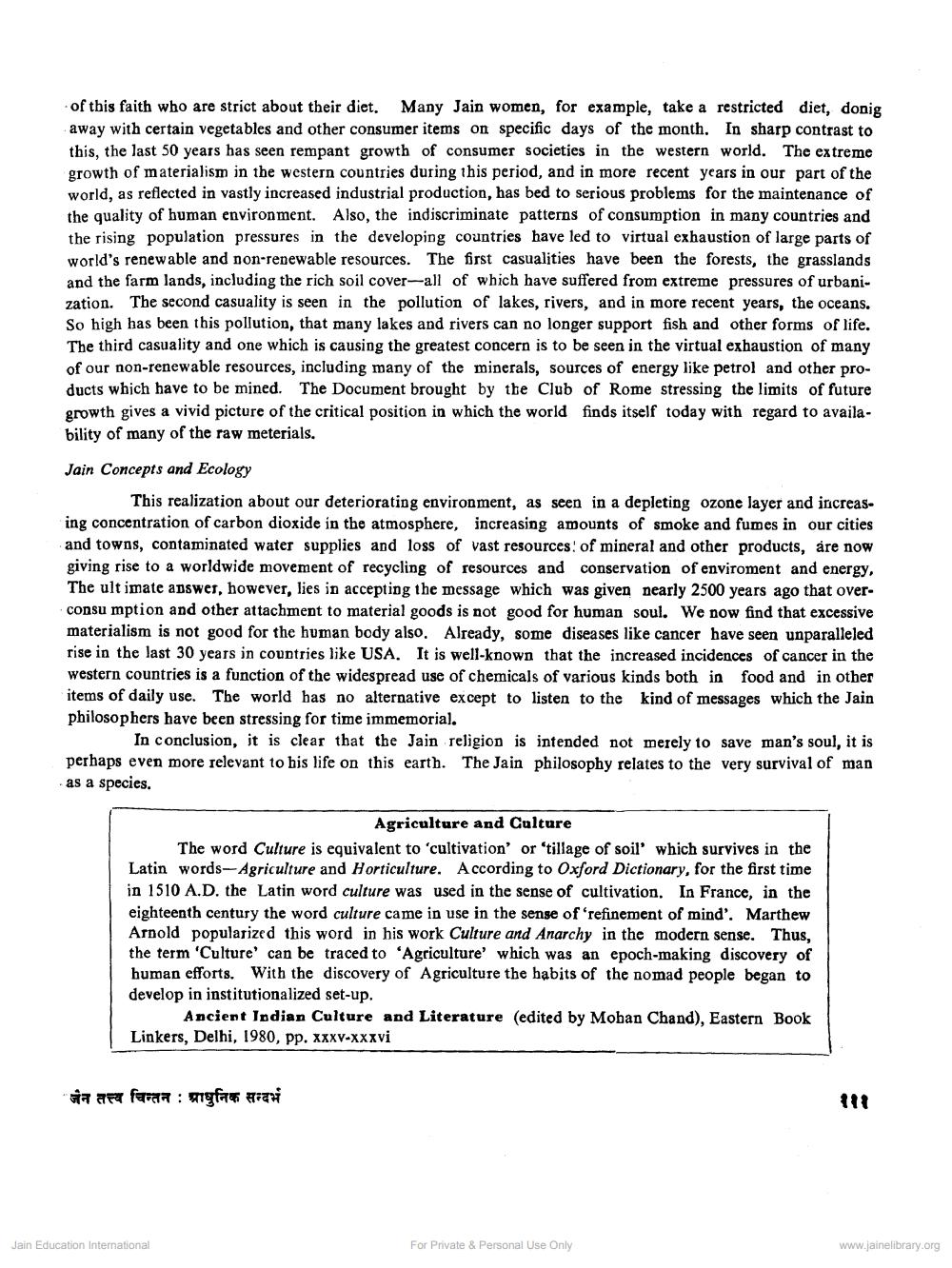Book Title: Evolution agriculture and the Jain Philosophy Author(s): H K Jain Publisher: Z_Deshbhushanji_Maharaj_Abhinandan_Granth_012045.pdf View full book textPage 4
________________ of this faith who are strict about their diet. Many Jain women, for example, take a restricted diet, donig away with certain vegetables and other consumer items on specific days of the month. In sharp contrast to this, the last 50 years has seen rempant growth of consumer societies in the western world. The extreme growth of materialism in the western countries during this period, and in more recent years in our part of the world, as reflected in vastly increased industrial production, has bed to serious problems for the maintenance of the quality of human environment. Also, the indiscriminate patterns of consumption in many countries and the rising population pressures in the developing countries have led to virtual exhaustion of large parts of world's renewable and non-renewable resources. The first casualities have been the forests, the grasslands and the farm lands, including the rich soil cover all of which have suffered from extreme pressures of urbanization. The second casuality is seen in the pollution of lakes, rivers, and in more recent years, the oceans. So high has been this pollution, that many lakes and rivers can no longer support fish and other forms of life. The third casuality and one which is causing the greatest concern is to be seen in the virtual exhaustion of many of our non-renewable resources, including many of the minerals, sources of energy like petrol and other products which have to be mined. The Document brought by the Club of Rome stressing the limits of future growth gives a vivid picture of the critical position in which the world finds itself today with regard to availability of many of the raw meterials. Jain Concepts and Ecology This realization about our deteriorating environment, as seen in a depleting ozone layer and increasing concentration of carbon dioxide in the atmosphere, increasing amounts of smoke and fumes in our cities and towns, contaminated water supplies and loss of vast resources of mineral and other products, are now giving rise to a worldwide movement of recycling of resources and conservation of enviroment and energy, The ultimate answer, however, lies in accepting the message which was given nearly 2500 years ago that overconsu mption and other attachment to material goods is not good for human soul. We now find that excessive materialism is not good for the human body also. Already, some diseases like cancer have seen unparalleled rise in the last 30 years in countries like USA. It is well-known that the increased incidences of cancer in the western countries is a function of the widespread use of chemicals of various kinds both in food and in other items of daily use. The world has no alternative except to listen to the kind of messages which the Jain philosophers have been stressing for time immemorial. In conclusion, it is clear that the Jain religion is intended not merely to save man's soul, it is perhaps even more relevant to his life on this earth. The Jain philosophy relates to the very survival of man as a species. Agriculture and Culture The word Culture is equivalent to 'cultivation' or 'tillage of soil' which survives in the Latin words- Agriculture and Horticulture. According to Oxford Dictionary, for the first time in 1510 A.D. the Latin word culture was used in the sense of cultivation. In France, in the eighteenth century the word culture came in use in the sense of 'refinement of mind'. Marthew Arnold popularized this word in his work Culture and Anarchy in the modern sense. Thus, the term 'Culture' can be traced to 'Agriculture' which was an epoch-making discovery of human efforts. With the discovery of Agriculture the habits of the nomad people began to develop in institutionalized set-up. Ancient Jodian Culture and Literature (edited by Moban Chand), Eastern Book Linkers, Delhi, 1980, pp. XXXV-XXXvi "जैन तत्त्व चिन्तन : प्राधुनिक सन्दर्भ Jain Education International For Private & Personal Use Only www.jainelibrary.orgPage Navigation
1 2 3 4
